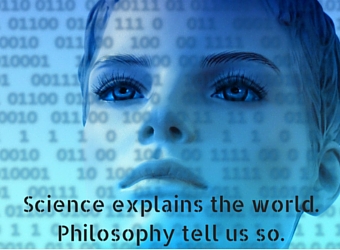COMPELLING TRUTH
The Limits of Science where God is Concerned
By Robin Schumacher

First, let me say: I love science. Even though my graduate degrees are in theology (which is the "queen of the sciences" by the way...) for my undergraduate degree, I studied engineering and business. I've been a database engineer for the past 20+ years and have enjoyed the fact that in my area of science, I am never bored.
The "I believe in science" claim of the atheists often carries with it the unspoken prepositional phrase: "unlike you, you backwards, non-scientific superstitionist." Well, the fact is many of us Christians are well schooled in various scientific disciplines, and the history of humanity is pregnant with brilliant scientists who had/have no trouble adhering to science and maintaining their faith in God. The laundry list of believing scientists is too long for me to list with any degree of fairness, but if you don't believe me, a quick internet search will give you an impressive registry.
What this list of scientists and I have in common is that none of us are believers in scientism. Scientism, in general, says we should only believe what can be scientifically proven. Such a statement simply goes too far for four reasons.
First, it is self-refuting. The statement "we should only believe what can be scientifically proven" itself cannot be scientifically proven (because it is a philosophical statement), and so based on its own criteria, it should be rejected.
Second, it ignores other much-respected and used methods for obtaining knowledge. For example, the legal/forensic/historical method of discovering truth is used every day and is very well respected. The legal method does not ignore testimony or facts because they are not reproducible or testable. By a process of elimination and corroboration, the legal method allows history and testimony to speak for itself until a verdict is reached beyond a reasonable doubt and the balance of probability is achieved.
So, for instance, I did not witness various battles that occurred through history and I cannot reproduce the Gallic wars so I must rely on documents and independent testimony to determine its plausibility. The bottom line is that certain kinds of tests are appropriate for different realms of thought.
Also, science is impotent in various situations such as the area of morals and ethics. Can science prove that the Nazis were evil?
Third, it ignores its own limitations and presuppositions that it needs to get started in the first place. A quick glance at the following assumptions shows that science is dependent upon a great many philosophical beliefs and/or things that cannot be scientifically proven:
- Mathematics
- Logic
- The existence of an actual physical, mind-independent world
- The uniformity of the natural world (no randomness + chance here!)
- The ability of the human mind to understand the natural world
- The belief we can trust our reasoning and sensory abilities, and thus are not deceived
- The belief that there are important criteria that make for a valid hypothesis
Fourth, it is guilty of committing the "nothing-buttery" logical fallacy, which is a reductive fallacy that argues something is nothing more than some mere aspect of it. Common examples include, "the mind is nothing more than the brain" and "thought is nothing more than a chemical reaction."
When I encounter someone who makes this last statement, I always ask them (if they're married or are currently involved with someone), "On special occasions like Valentine's Day, do you look at your partner and say 'Sweetheart, I love you!' or do you say 'Sweetheart, I'm having a chemical reaction!'?"
Such a thing reminds of William J. M. Rankine (a 19th century physicist) and his poem, "The Mathematician in Love":
A mathematician fell madly in loveSo very quickly we see how scientism falls far short of its claim. Now, the thing to keep in mind is that the sometimes-spoken/mostly-unspoken goal of scientism is to deny the reality of the supernatural, but it simply fails. It suffers from far too many limitations and is powerless in its attempt to deny the existence of God.
With a lady, young, handsome, and charming:
By angles and ratios harmonic he strove
Her curves and proportions all faultless to prove.
As he scrawled hieroglyphics alarming.
No doubts of the fate of his suit made him pause,
For he proved, to his own satisfaction,
That the fair one returned his affection; — "because,
"As every one knows, by mechanical laws,
"Re-action is equal to action."
"Let x denote beauty, — y, manners well-bred, —
"z, Fortune, — (this last is essential), —
"Let L stand for love" — our philosopher said, —
"Then L is a function of x, y, and z,
"Of the kind which is known as potential."
"Now integrate L with respect to d t,
"(t Standing for time and persuasion);
"Then, between proper limits, 'tis easy to see,
"The definite integral Marriage must be: —
"(A very concise demonstration)."
Said he — "If the wandering course of the moon
"By Algebra can be predicted,
"The female affections must yield to it soon" —
— But the lady ran off with a dashing dragoon,
And left him amazed and afflicted.
The atheists and philosophical naturalists who think otherwise may be interested in listening to one of their own champions — Stephen Jay Gould — in his assessment of the situation:
Either half of my colleagues are enormously stupid, or else the science of Darwinism is fully compatible with conventional religious beliefs...Science simply cannot adjudicate the issue of God's possible existence. We neither affirm it nor deny it; we simply can't comment on it as scientists.
Image Credit: geralt; untitled; Creative Commons
comments powered by Disqus
Published 1-7-12

